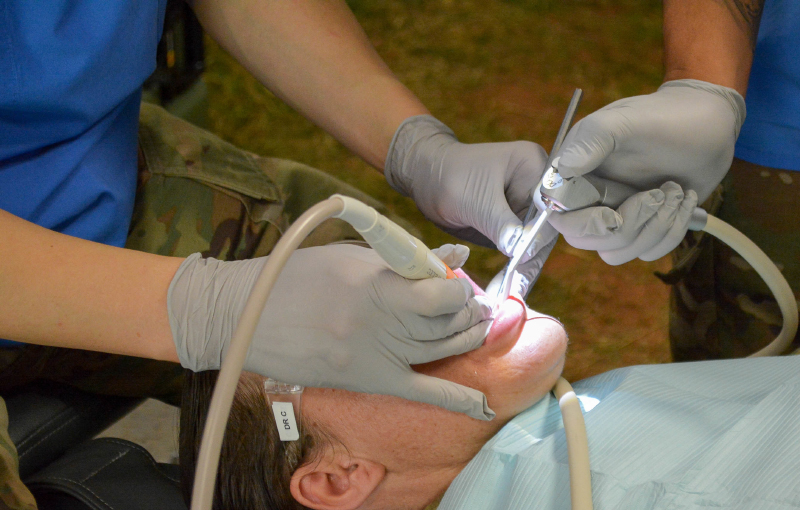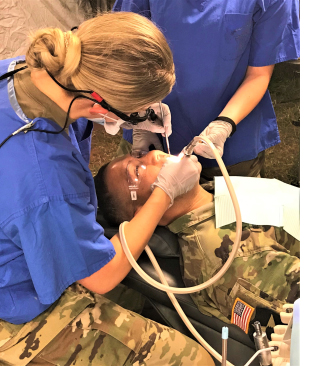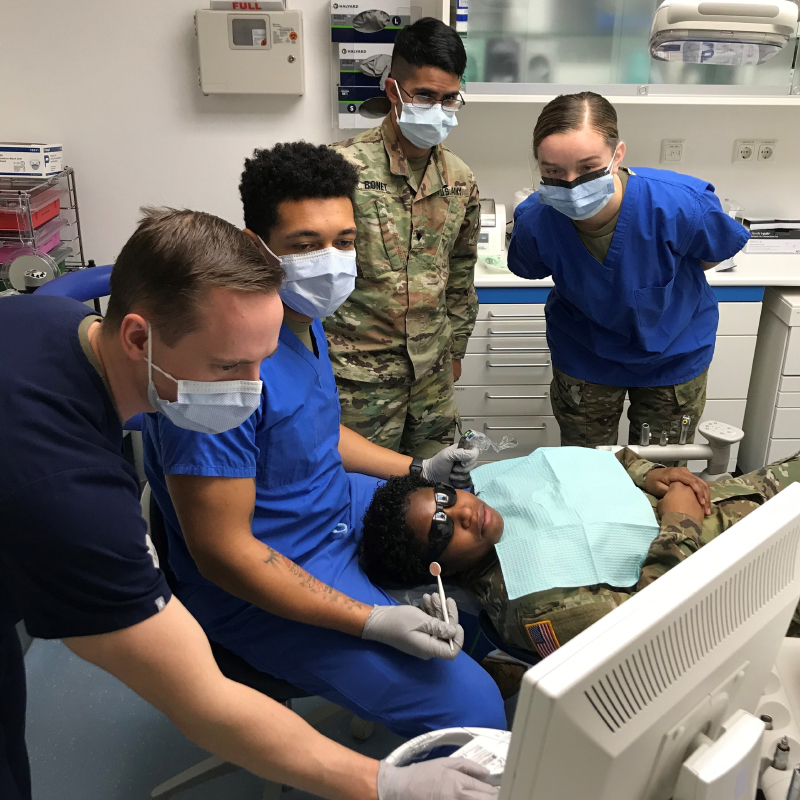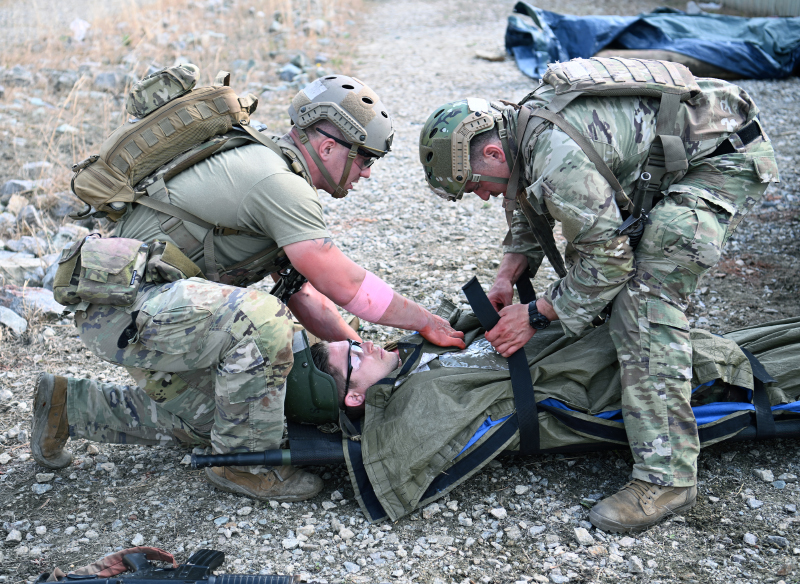Special Operations Forces (SOF) operate in high-stakes, austere environments where dental emergencies can jeopardize operator readiness and mission success. The spectrum of support provided by Army dentists ensures operators remain deployable and effective in these dynamic environments. Army dentists, as critical medical enablers, must have a deep understanding of SOF's unique mission and culture to deliver timely, effective care and training. While Army dentists have historically contributed to unit readiness and operational outcomes, dental representation within SOF remains limited to Special Forces (SF) groups and the Civil Affairs brigade, leaving gaps in capability and mentorship. A dental officer assigned to the United States Army’s Special Operations Center of Excellence (SOCoE) would provide SOF medics and dentists with an advocate and mentor at this critical command level. This article examines the Army Dental Corps' engagement with SOF, identifies deficiencies in current dental support, and proposes a path to enhance the delivery of care, medical training, and force readiness. By integrating an experienced SOF dentist in a key position, the Army can strengthen operator health, improve training outcomes, and ensure mission success in any environment.
Dental Support to U.S. Army Special Operations

Soldiers from Dental Health Command-Europe conduct a dental exam, Sept. 4, on a Soldier. (U.S. Army photo by Russell Toof)
An Army dentist's contributions to SOF encompass three key areas: garrison clinical care, expeditionary demands, and the training of SOF medics. In garrison, dentists provide direct patient care and specialist referrals, ensuring operator readiness and minimizing dental emergencies. Dentists enhance the flexibility of dental clinics supporting SOF, capitalizing on limited windows to deliver care. However, the Dental Corps and SOF must deepen their mutual understanding of each other to overcome barriers to care delivery and to recognize the risks of neglecting dental readiness. Senior-level mentorship and advocacy are crucial for addressing these challenges and preserving critical lessons for long-term knowledge management.
Downrange, the utilization of dentists to support operational requirements can be a significant force multiplier for the SOF enterprise. Historically, Army dentists have supported SOF core activities, such as Foreign Internal Defense and Unconventional Warfare, by leveraging expeditionary dental support to marginalized communities to build relations and expand civil networks. During the Global War on Terror (GWOT), SOF dentists served as force multipliers, leveraging dental care as a platform to build trust and provide commanders with avenues for access and placement. Additionally, when dental needs exceed organic medical capabilities of teams while downrange, SOF dentists can deploy to provide advanced care. It is this understanding of operational environments and the ability to align dental capabilities with SOF-specific missions that makes Army dentists indispensable enablers.
Additionally, the training of SOF medics is a critical aspect of an Army dentist’s support to SOF units. Nicholson et al. estimated that up to 17% of prolonged field care casualties could be dental emergencies.01 In denied spaces with prolonged evacuation times, these casualties can accumulate and deteriorate, depleting already limited resources. SOF medics manage these emergencies when dentists are unavailable, but their competent practice of expeditionary dentistry relies on robust training. Through medical proficiency training and non-trauma modules (NTM), Army dentists enhance the basic dental skills and knowledge that SOF medics receive during courses at the Joint Special Operations Medical Training Center (JSOMTC). During NTMs, Army dentists hone a medic's skills and make recommendations on instrument selection and material usage. These modules become the foundation of SOF medics' dental knowledge and experience, which they then apply operationally.
Obstacles to the Treatment of SOF Patients and Training of SOF Medics
 Army dentist performs dental work on a Soldier during a field training exercise held recently at Baumholder, Germany. (U.S. Army photo by Kirk Frady)
Army dentist performs dental work on a Soldier during a field training exercise held recently at Baumholder, Germany. (U.S. Army photo by Kirk Frady)
Despite the importance of dental support, significant obstacles remain to the effective treatment of SOF patients and training of SOF medics. This is particularly evident at Fort Bragg's dental clinics, which encounter challenges in providing comprehensive care to SOCoE students throughout their training phases. Students often delay essential medical and dental treatments to avoid interrupting training schedules. Additionally, during the authors' tenure as SF group providers, emergent dental needs were often inaccurately documented or poorly tracked during transitions to permanent duty stations, leading to complications in follow-on care. In contrast, SOCoE instructors have prime opportunities to address previously deferred treatments due to training or deployments. However, without a dedicated dentist assigned to the SOCoE for direct treatment and advocacy for specialty referrals, only basic needs are likely to be resolved. Preferably, both students and instructors should depart the SOCoE healthy for deployment, or with follow-on care coordinated at their next assignment.
During operations in Iraq and Afghanistan, 24% of dental disease non-battle injuries (D-DNBI) among U.S. Army personnel were classified as high or moderate severity, with D-DNBI risks escalating 4.6% per additional deployment month.02 SOF deployments, ranging from weeks to several months, often leave the SOF medic as the sole dental resource available. SOF medics are expected to provide advanced-level dental care in emergencies; however, they often lack sufficient practice or preparation, despite their initial exposure to dental care during their training at the SOCoE. A 2015 survey by COL Ramey Wilson of SF medics undergoing refresher training rated dental skills as "low confidence, moderately high importance," underscoring the need for improved skill development and sustainment.03 Currently, experienced and invaluable U.S. Army Reserve dentists provide monthly training at the JSOMTC. However, these dental officers lack a full-time, active-duty dental subject matter expert (SME) to lead dental education or provide clinical care at Fort Bragg. Post-SOCoE, dental training is intended to continue at the unit level in dental treatment facilities. But no standardized dental curriculum exists for SOF medics, and dentists typically train based on their own experience. Furthermore, obstacles arise when dental treatment facilities are hesitant to allow SOF medics to practice dentistry under supervision. This reliance on individual dentists' experiences and local agreements with dental facilities introduces vulnerabilities into the sustainment of dental training among SOF medics.
Recommendation: Integrating Permanent Dental Capabilities at the SOCoE

Enlisted dental assistant Soldiers training on the latest digital dentistry technology. (U.S. Army photo by Kirk Frady)
In 2019, the area of concentration for SF group dentists shifted to 63B (Comprehensive Dentist), equipping groups with providers who undergo a two-year residency. The change provided SF groups with a dental officer better prepared to manage complex cases, enhanced SF medic training, and minimized the potential for evacuation in anti-access/area denial scenarios. Additionally, 63Bs have played a critical role in the Dental Corps' modernization initiative. The dental equipment issued to SOF units for over two decades is ill-suited to mission demands. The emphasis on preparation for LSCO means that both conventional and unconventional units demand an agile dental sustainment response. SOF's practice of expeditionary dentistry serves as a model for the ongoing effort to develop lighter, more scalable dental equipment sets. The integration of 63Bs demonstrates that incorporating dental capability at key echelons directly drives the optimization of dental support to SOF in treatment and training.

Nicholson et al. estimated that up to 17 percent of prolonged field care casualties could be dental emergencies.01 (U.S. Army photo K. Kassens)
Despite this, no dental positions exist within SOF beyond those at SF groups and the Civil Affairs brigade. Establishing a new clinical and administrative position would elevate dental care for SOF Soldiers, while creating an additional career-broadening experience for Army dentists. This billet, ideally for an O-4 to O-5 with prior dental experience in SOF units, would provide SOCoE students and instructors access to a dedicated provider with a flexible schedule. Through referrals to specialty providers, the SOCoE dentist could facilitate the completion of complex treatments for SOCoE patients, allowing them to utilize this time to achieve optimum health before reintegration with the operational force. Moreover, this role would ensure continuity and modernization of dental instruction for SOF medics at the JSOMTC and across SOF units by fostering dialogue among active-duty and National Guard SOF dentists. Such a position would optimize the treatment and training of SOCoE personnel and provide the Dental Corps with a colleague and advocate at the SOCoE, thereby effectively addressing current obstacles to the training and care of SOF personnel.
Conclusion
Dentistry plays a pivotal role in Soldier readiness and quality of life, particularly within SOF, where operational demands amplify the risks of dental issues. Applying conventional care models to unconventional units results in systemic shortcomings that undermine Soldier needs and hinder support for SOF activities. Addressing the unique requirements of SOF missions demands a tailored strategy to bolster readiness and training. Assigning a dentist with deep Special Operations expertise at SOCoE can bridge longstanding capability gaps between the Dental Corps and SOF. This enhanced collaboration will deliver superior outcomes in treatment, training, and mentorship, ensuring SOF operators remain mission-ready for future battlefields.
About the Authors
Lt. Col. Ross Cook is a comprehensive dentist, the Assistant Program Director for FT Campbell's 1-Year AEGD residency, and the Army Dental Corps' Operational Dentistry Deputy Consultant. Dr. Cook served as the 10th SFG(A) Group Dental Surgeon from 2014 to 2018 with deployments to Chad, Niger, Tajikistan, and Afghanistan. He served as the OIC of the Smoke Bomb Hill Dental Clinic at Fort Bragg from 2022 to 2023.
Maj. (Promotable) Abby Raymond is currently the 20th SFG(A) Group Dental Surgeon. He served on active duty from 2011 to 2016, where he was a Brigade Dental Surgeon for the 101st ABN DIV (AASLT) and 7th SFG(A), with deployments to Afghanistan and South America. In 2020, he deployed with 20th SFG(A) as the U.S. Planner (J-5) for SOJTF-OIR.
Col. (Retired) Gerald Surrett is a physician who previously served as an enlisted 18C and 18D, an SF Battalion and Group Surgeon, TSOC Surgeon, Diving Medical Officer at the SFUWO Combat Dive School, as a SOTF, SOJTF, and CJSOTF Surgeon (deployed), the USSOUTHCOM Command Surgeon, and as a brigade surgeon with an IBCT.
Maj. Gen. (Retired) Thomas Tempel served as the 1st SFG(A) Dental Surgeon and SOTF Dental Surgeon. He then went on to command at every level in the AMEDD from CPT to MG, serving as the 27th Corps Chief of the U.S. Army Dental Corps.
Chief Warrant Officer 4 (Retired) Gary Shimizu is a retired Special Forces Warrant Officer and former Special Forces Medic. He was drafted in 1972 and then enlisted in the Special Forces Medic program in 1974. He served as the SF Medical Supervisor/Diving Medical Technician on a SCUBA team in the 7th SF Group and Special Forces Detachment-Korea, and later as the Battalion Medical Supervisor, standing up 1/1st SFG(A) in Okinawa from 1983 to 1986. In 1986, he was commissioned as a Special Forces Warrant Officer, serving in 1/1st SFG(A), 2/1st SFG(A), 1st SFG(A), and USASOC Army Compartmented Element (ACE). He retired in 2002 and continues to serve as an Army Civilian at USASOC.
Disclosures: The authors have no financial disclosures to report.
Disclaimer: The opinions and views contained herein are the private views of the authors and are not to be construed as official or reflecting the views of the Department of Defense or U.S. Government.
References
01 Nicholson, J A et al. “Editorial on the Approach to Prolonged Field Care for the Special Forces Medical Sergeant: Balancing the Opportunity Cost.” Journal of Special Operations Medicine, 20:3 2020, pp. 117-119.
02 Wojcik, Barbara. E. et al. “Risk of Dental Disease Non-Battle Injuries and Severity of Dental Disease in Deployed U.S. Army Personnel.” Military Medicine, 180:5 May 2015, pp. 570–577.
03 Ramey, Wilson. “Keeping the Scalpel Sharp.” Questionnaire. 15 May 2015.